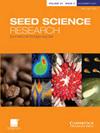J.Derek Bewley职业讲座。种子——植物——作物——生物多样性——环境——人:阐释理解和想法
IF 1.9
3区 生物学
Q2 PLANT SCIENCES
引用次数: 0
摘要
摘要在国际种子科学学会三年一度的会议上发表的J.Derek Bewley职业讲座通过提供职业晚期科学家对经验教训和未来影响的回顾性观点,为早期职业种子科学家提供支持。抱负、能力、灵感、远见、勤奋和机会是显而易见的职业要求。强调了指导和团队合作的重要性,以及对结果、理解和想法的清晰沟通。阐述了插图在研究及其传播中的作用:插图可以支持假设的发展、测试和交流。气候变化可能会干扰高质量种子的生产,影响保护以及农业、园艺和林业。小麦(Triticum aestivum L.)和水稻(Oryza sativa L气候,同时保护生物多样性(通过种子生态学和技术,如通过在基因库中长期储存种子来保护迁地植物遗传资源),但前提是该研究能够应用。本文章由计算机程序翻译,如有差异,请以英文原文为准。
The J. Derek Bewley Career Lecture. Seeds–plants–crops–biodiversity–environment–people: illustrating understanding and ideas
Abstract The J. Derek Bewley Career Lectures presented at the triennial meetings of the International Society of Seed Science support early-career seed scientists by providing retrospective views, from those late in their careers, of lessons learned and future implications. Ambition, ability, inspiration, foresight, hard work and opportunity are obvious career requirements. The importance of mentoring and teamwork combined with the clear communication of results, understanding and ideas are emphasized. The role of illustration in research, and its dissemination, is outlined: illustration can support hypothesis development, testing and communication. Climate change may perturb the production of high-quality seed affecting conservation as well as agriculture, horticulture and forestry. An illustrative synthesis of the current understanding of temporal aspects of the effects of seed production environment on seed quality (assessed by subsequent seed storage longevity) is provided for wheat (Triticum aestivum L.) and rice (Oryza sativa L.). Seed science research can contribute to complex global challenges such as future food supplies from seed-propagated crops in our changing climate whilst conserving biological diversity (through seed ecology and technologies such as ex situ plant genetic resources conservation by long-term seed storage in genebanks), but only if that research can be – and then is – applied.
求助全文
通过发布文献求助,成功后即可免费获取论文全文。
去求助
来源期刊

Seed Science Research
生物-植物科学
CiteScore
3.60
自引率
4.80%
发文量
23
审稿时长
>12 weeks
期刊介绍:
Seed Science Research, the official journal of the International Society for Seed Science, is a leading international journal featuring high-quality original papers and review articles on the fundamental aspects of seed science, reviewed by internationally distinguished editors. The emphasis is on the physiology, biochemistry, molecular biology and ecology of seeds.
 求助内容:
求助内容: 应助结果提醒方式:
应助结果提醒方式:


